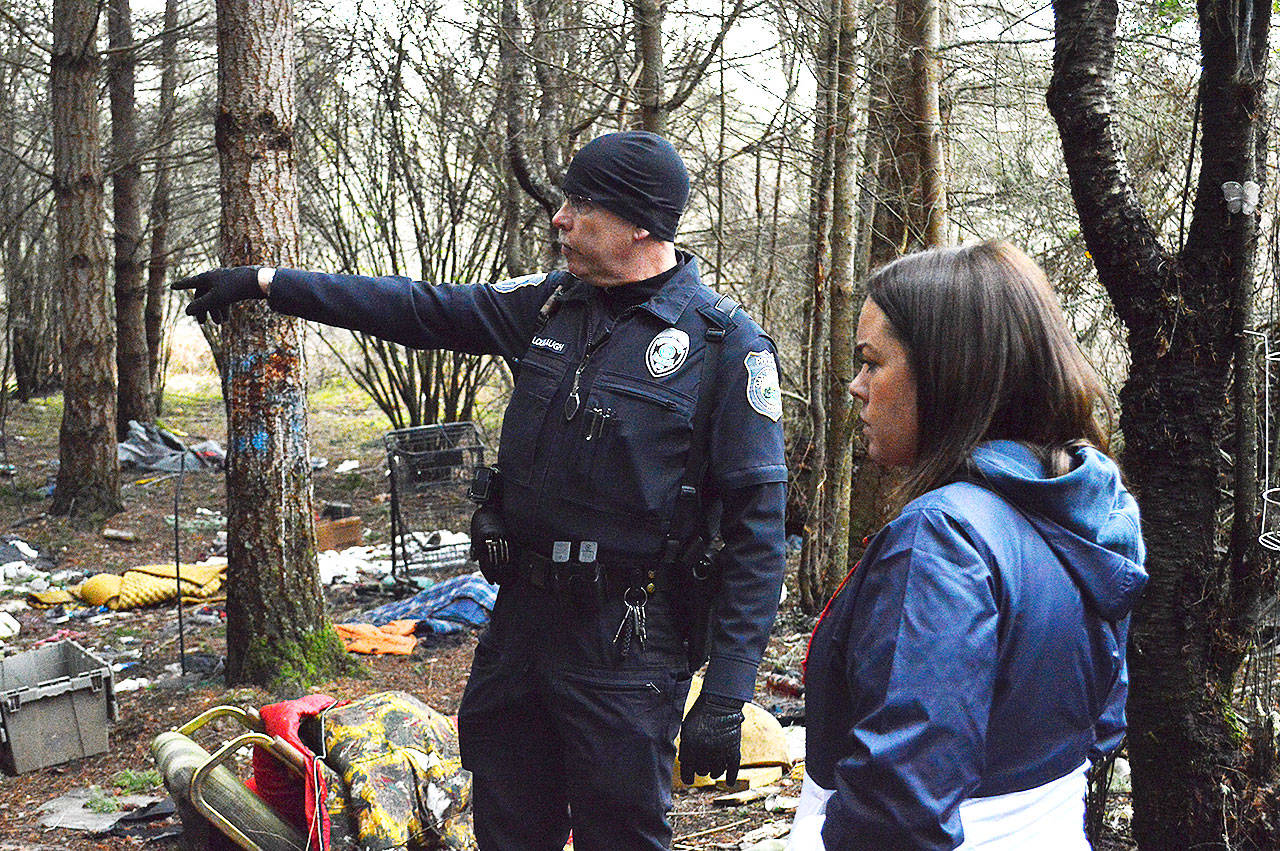Those going into an area on the island known as “the pit” are often advised not to wear shoes that are valuable.
The piece of private land off Goldie Road is an area known to law enforcement and social workers as a common place for homeless encampments to pop up. Though the number of people who reside there fluctuates, there are always signs of life: tents, tarps, dilapidated furniture, discarded clothes and piles upon piles of trash.
It’s a well-known issue among public officials and some residents, but few seem to know what needs to be done.
“WE’VE NEVER received any formal complaints about ‘the pit’ or garbage there,” said Keith Higman, Island County public health director.
Because it’s located on private property, he said his staff couldn’t investigate without a written complaint or administrative search warrant.
Capt. Bill Wilke, of the Oak Harbor Police Department, said the property owner has reached out to the department seeking assistance removing the people who live there.
There seems to be a near constant cycle of people being cleared out, or leaving on their own, and then later slowly returning or being replaced by newcomers, according to Richard West, a county social worker.
West previously worked as lead community corrections officer for the state Department of Corrections and said he frequently visited the area in his position.
He sometimes found only abandoned camps and other times he encountered 20 people living there at once.
There were numerous reasons for people leaving, but he said he knew law enforcement played a significant role if requested to do so by the owner.
THE APPROXIMATELY nine-acre parcel is owned by Tiproc Corp., based in Menlo Park, Calif.
According to information on the Island County Assessor’s website, the corporation acquired the land in 2006.
Kristi Jensen, a real estate agent who worked on the transaction, said the owners originally wanted to develop the site, but changed their mind.
Jensen said the property went back on the market a couple of months ago.
An owner or employee of Tiproc couldn’t be reached for comment.
THERE IS no visible fence around most of the area and there are no garbage cans, dumpsters or toilets. West said he’s encountered a number of potentially hazardous items there, such as broken glass, used hypodermic needles, propane tanks and, sometimes, human waste.
He also met a wide variety of people in a wide variety of situations.
“You have some people just trying to survive,” West said. “People there are going to work, it just happens to be the situation they’re in as well as people there because of what the situation attracts.”
Drugs, a place to hide out from warrants, a place to socialize, he said, “a combination at any given time.”
ISLAND COUNTY Sheriff Rick Felici and Wilke both said they weren’t aware of any program to distribute trash bags, nor do their personnel do so.
Ultimately, it’s the property owner who’s responsible for cleaning the garbage, Wilke said. There’s limited information about Tiproc Corporation online and what it does. It’s Menlo Park address is located in what appears to be a residential neighborhood.
Manta, an online database of small businesses said it has approximately two employees and an annual revenue of just over $75,000.
WEST SAID he sometimes found the area attracted people who weren’t homeless but came because of the drug or alcohol scene. Other times, he found people actively avoiding those kinds of activities.
Some social workers, such as the county’s opioid outreach coordinator Dennis Phillips, have been to the area a couple of times to help connect addicts to treatment.
But Phillips has only been there on occasion because his primary focus is on South Whidbey and Camano Island.
WHEN SEARCHING the area in January during the annual Point in Time homeless population count, Phillips did find several signs of drug use in the area but no people.
However turbulent its population and activities gets, the trash in “the pit” remains. West said he sometimes saw periodic improvements, although he couldn’t say who was responsible for them.
But “then, sometimes within a week or two, it would be right back to trash everywhere.”



